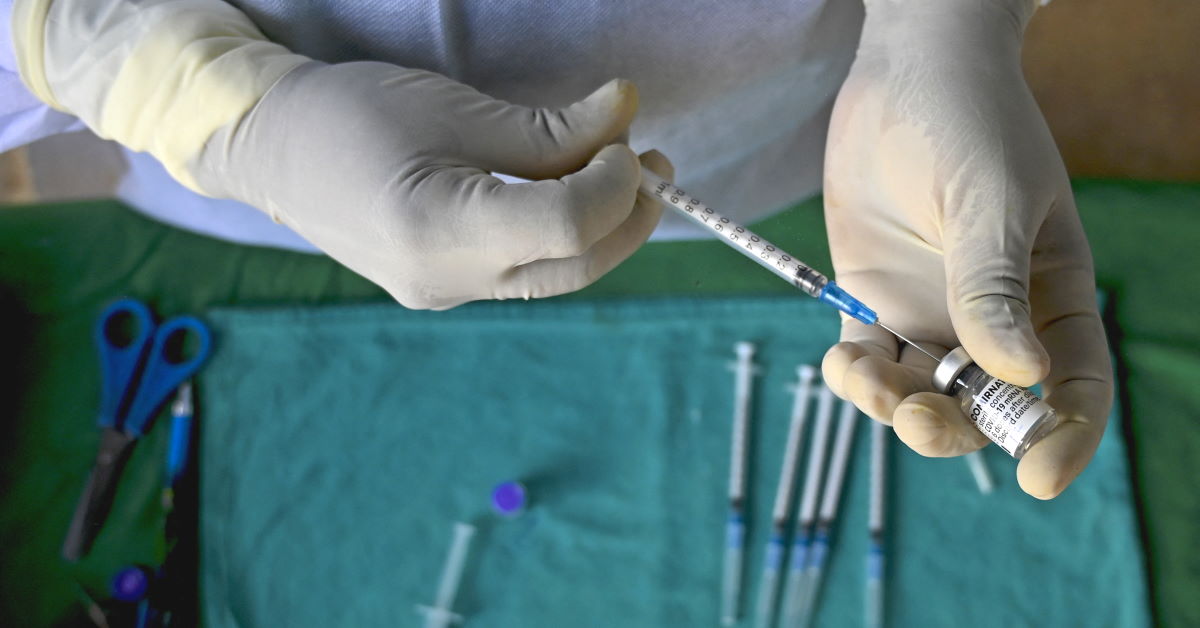Pfizer and BioNTech announced they would seek authorisation for a third dose of their COVID-19 vaccine to boost its efficacy, as the Delta variant drove devastating outbreaks in Asia and Africa and cases rose again in Europe and the United States (US).
With the pandemic once again wreaking havoc, Japan has banned fans from most Olympic events and placed Tokyo under a virus state of emergency throughout the Games just two weeks before the opening ceremony.
Delta is the most infectious strain of the virus since the start of the global pandemic early last year.
Originally detected in India, it has quickly spread and is accelerating outbreaks even in countries with high vaccination rates, leading the World Health Organization (WHO) to warn this week that the world was at a "perilous point" as the official global death toll passed four million.
Pfizer and BioNTech said Thursday they expected that a third dose will perform well against the strain, and that they would be seeking authorisation in the US, Europe and other regions in coming weeks.
Initial data from an ongoing trial showed a third shot pushed antibody levels five to 10 times higher against the original coronavirus strain and the Beta variant, first found in South Africa, compared with the first two doses alone, according to a statement.
The companies said they expected similar results for Delta – but added they were also developing a vaccine specifically tailored to fight the deadly strain.
The news came after Japan, where the variant currently accounts for around 30 percent of cases, said it would ban spectators from almost all Olympic venues in light of a new state of emergency imposed on the capital.
The Olympic flame arrived in the Japanese capital Friday, in a muted finish to a nationwide torch relay that was supposed to stoke excitement about the Games but which has been taken off public roads or otherwise altered because of virus concerns.
'Do Not Leave Your Home'
Elsewhere in Asia, Vietnam's Ho Chi Minh City went into a two-week lockdown, with residents now barred from gathering in groups larger than pairs in public, and people are only allowed to leave home to buy food, medicine and in case of emergencies.
Police have also set up check-points at city borders and only those with negative test results can get in.
In Indonesia, desperately needed supplies of oxygen and protective equipment arrived from neighbouring Singapore.
Indonesia has become a global COVID-19 hotspot, with a fierce outbreak leaving hospitals struggling to cope – many are now refusing new patients, leaving scores to die at home, while desperate relatives hunt for oxygen tanks to treat the sick.
Indonesia, with a population of 270 million, now has a recorded caseload of over 2.4 million – but testing rates are low and experts believe the true figure is far higher.
The virus is also returning to many places once held up as models in combating the pandemic.
Authorities in Australia’s largest city Friday tightened a now three-week lockdown as new COVID-19 infections hit a record and authorities warned an outbreak of the Delta variant was spinning out of control.
"Do not leave your home unless you absolutely have to," state premier Gladys Berejiklian told Sydney's five million residents, warning they were facing the greatest threat to their safety "since the pandemic started".
And South Korea said it would raise coronavirus curbs to their highest level in the Seoul metropolitan area, with prime minister Kim Boo-kyum warning a record spike in new cases had reached "maximum crisis level".
Almost half the South Korean population will now be barred from gathering in groups of more than two people after 6:00 pm for two weeks and schools will be shut, among other new restrictions.
Meanwhile in Brazil, which has the world's second-highest known COVID-19 death toll after the US, authorities have said the variant was spreading rapidly in the country's most populous state Sao Paulo.
Also badly hit and struggling to cope is Africa, where the WHO warned the worst was yet to come after the most disastrous week in its history of pandemics.
"The fast-moving third wave continues to gain speed and new ground," said Dr Matshidiso Moeti, the WHO's regional director for Africa.
Delta is making itself felt even in places where vaccination drives have been robust.
France on Thursday advised its citizens against travelling to Spain and Portugal because of a Delta-caused spike in cases. – AFP
